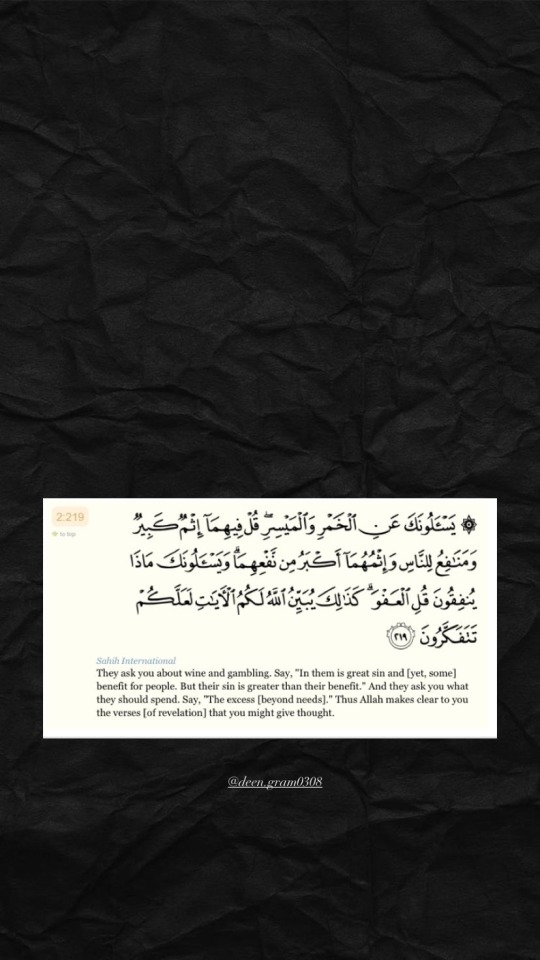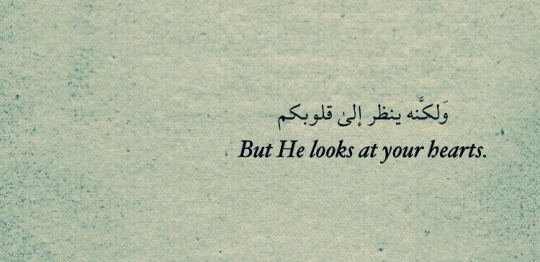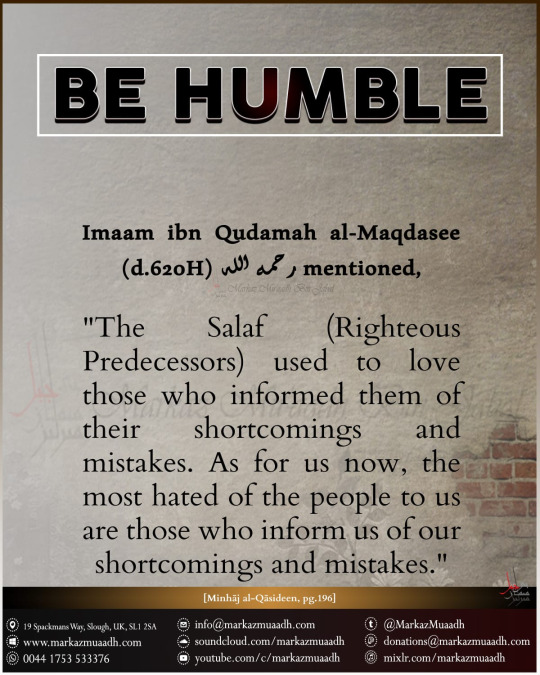Text
One of the most common MAJOR MISTAKES is deleting the letter ة when stopping on a word!
Example:
Stopping on the word ٱلۡقَارِعَةُ {Qur'ān 101:1} as ٱلۡقَارِعَ.
The correct stopping should be ٱلۡقَارِعَه.
The letter ة is pronounced as ها when stopping on it.
12 notes
·
View notes
Text
Ibn Umar رضي الله عنه said:
“Taqwa” is when you don’t see yourself better than anyone.”
(تفسير البغوي ٦٠/١)
57 notes
·
View notes
Text

Things prohibited in Islam are prohibited for a reason, If only we knew.
2 notes
·
View notes
Text

Abu Hurairah (RAA) narrated that the Messenger of Allah (ﷺ) said:
“If anyone relieves a Muslim believer from one of the hardships of this worldly life, Allah will relieve him of one of the hardships of the Day of Resurrection. If anyone makes it easy for the one who is indebted to him (while finding it difficult to repay), Allah will make it easy for him in this worldly life and in the Hereafter, and if anyone conceals the faults of a Muslim, Allah will conceal his faults in this world and in the Hereafter. Allah helps His slave as long as he helps his brother.” Related by Muslim
#islam#quran or hadiths#sunnah#muslimah#islamicquotes#islamicpost#allah#deen#akhirah#explore#religion
18 notes
·
View notes
Text
THE SUNNA OF THE PROPHET (peace and blessings be upon Him ) : The Sunna’s Role . Part1
The Sunna has two main functions.
First, it enjoins and prohibits, lays down the principles related to establishing all religious obligations and necessities, and determines what is lawful or unlawful.
Second, it interprets the Qur’an.
In each daily prescribed prayer, we recite:
Guide us to the Straight Path, to the path of those you have blessed, not of those who incurred (Your) wrath, nor of the misguided (1:5–7).
The verses mention, but do not specify, two groups of people. According to the Prophet, those who incurred God’s wrath are Jews who have gone astray, and the misguided are Christians who have gone astray. ( Tirmidhi, “Tafsir al-Qur’an,” 2; Tabari, “Tafsir,” 1:61, 64. )
The Jews killed many of their Prophets and caused trouble in many places. Although they had once followed Divine guidance and guided others to the Straight Path (during the times of Moses, David, and Solomon), over time many of them went astray and incurred both God’s wrath and public ignominy. Those who follow this way also are included in those who incurred (Your) wrath. Such Jews are condemned harshly in the Bible as well. In fact, the Bible is much harsher toward them than the Qur’an. In many verses, the Qur’an reproaches such Jews and Christians very mildly and compassionately.
At first, the Christians obeyed Jesus and followed his way despite severe persecution. They heroically resisted all forms of hypocrisy and Roman oppression. But over time, many came under the influence of various Middle Eastern religions and philosophies as well as Roman paganism. By the time Christianity became the Roman Empire’s official religion, it already was divided into many sects and had more than 300 Gospels in circulation. Although many remained devoted to the original creed of Jesus, many others contaminated these pure teachings with borrowed elements. The Qur’an therefore describes them as the misguided.
By making the above interpretation, the Prophet explained how people who had been blessed with Divine guidance could go astray and end up deserving God’s wrath. Thus, he warned Muslims not to follow such Jews and Christians.
Out of many examples showing how the Sunna interprets the Qur’an, we also cite the following:
• When the verse:
Those who believed and did not mix their belief with wrongdoing: for them is security and they are those who are truly guided (6:82)
was revealed, the Companions, well aware what wrongdoing meant, asked the Messenger fearfully:
“Is there one among us who has never done wrong?” The Messenger explained: “It’s not as you think. It’s as Luqman said to his son:
Don’t associate any partners with God; surely, associating partners with God is a grave wrongdoing (31:13). ( Bukhari, “Tafsir,” 31/1. )
• ‘A’isha and Ibn Mas’ud are of the opinion that the mid-time prayer in:
Attend the prayers without any omission and the mid-time prayer (2:238)
is the afternoon prayer. Once ‘A’isha ordered her servant to write a copy of the Qur’an for her and reminded her:
“When you come to the verse: Attend the prayers without any omission, and the mid-time prayer, inform me.”
When this verse was to be copied out, ‘A’isha dictated to her servant: Attend the prayers without any omission, and the mid-time prayer, the afternoon prayer, and added: “This is what I heard from the Messenger.” ( Tirmidhi, “Tafsir al-Qur’an,” 3. )
Although there are some other interpretations, ‘A’isha and Ibn Mas’ud were certain that it was the afternoon prayer.
1 note
·
View note
Text
Tafsir Ibn Kathir: Surah Al-Baqarah Ayah 260
In the Name of Allah, the Most Gracious, the Most Merciful.
260. And (remember) when Ibrahim said, “My Lord! Show me how You give life to the dead.”
He (Allah) said: “Do you not believe!”
He (Ibrahim) said: “Yes (I believe), but to be stronger in faith.”
He said: “Take four birds, then cause them to incline towards you (then slaughter them, cut them into pieces), and then put a portion of them on every hill, and call them, they will come to you in haste. And know that Allah is All-Mighty, All-Wise.”
The Khalil Supplicates to Allah to Show Him How He Resurrects the Dead
Allah tells;
“My Lord! Show me how You give life to the dead.”
He (Allah) said: “Do you not believe!”
He (Ibrahim) said: “Yes (I believe), but to be stronger in faith.”
The scholars said that; there are reasons behind this request by Ibrahim.
For instance, when Ibrahim said to Nimrod, (My Lord (Allah) is He Who gives life and causes death,) he wanted to solidify his knowledge about resurrection by actually witnessing it with his eyes.
Al-Bukhari recorded that Abu Hurayrah said that the Messenger of Allah said, We are more liable to be in doubt than Ibrahim when he said, “My Lord! Show me how You give life to the dead.” Allah said, “Don’t you believe!”
Ibrahim said, “Yes (I believe), but (I ask) in order to be stronger in faith.”
The Prophet’s statement in the Hadith means, “We are more liable to seek certainty.”
The Answer to Al-Khalil’s Request
Allah said,
He said: “Take four birds, then cause them to incline towards you.”
Scholars of Tafsir disagreed over the type of birds mentioned here, although this matter in not relevant due to the fact that the Qur'an did not mention it.
Allah’s statement, cause them to incline towards you, means, cut them to pieces.
This is the explanation of Ibn Abbas, Ikrimah, Sa`id bin Jubayr, Abu Malik, Abu Al-Aswad Ad-Dili, Wahb bin Munabbih, Al-Hasan and As-Suddi.
and then put a portion of them on every hill, and call them, they will come to you in haste.
Therefore, Ibrahim caught four birds, slaughtered them, removed the feathers, tore the birds to pieces and mixed the pieces together. He then placed parts of these mixed pieces on four or seven hills.
Ibn Abbas said,
“Ibrahim kept the heads of these birds in his hand. Next, Allah commanded Ibrahim to call the birds to him, and he did as Allah commanded him. Ibrahim witnessed the feathers, blood and flesh of these birds fly to each other, and the parts flew each to their bodies, until every bird came back to life and came walking at a fast pace towards Ibrahim, so that the example that Ibrahim was witnessing would become more impressive. Each bird came to collect its head from Ibrahim’s hand, and if he gave the bird another head the bird refused to accept it. When Ibrahim gave each bird its own head, the head was placed on its body by Allah’s leave and power. ”
This is why Allah said, And know that Allah is All-Mighty, All-Wise.
and no one can overwhelm or resist Him.
Whatever Allah wills, occurs without hindrance, because He is the All-Mighty, Supreme above all things, and He is Wise in His statements, actions, legislation and decrees.
Abdur-Razzaq recorded that Ma`mar said that Ayub said that Ibn Abbas commented on what Ibrahim said, (but to be stronger in Faith), “To me, there is no Ayah in the Qur'an that brings more hope than this Ayah.”
Ibn Abi Hatim recorded that Muhammad bin Al-Munkadir said that; Abdullah bin Abbas met Abdullah bin Amr bin Al-`As and said to him, “Which Ayah in the Qur'an carries more hope for you?”
Ibn Amr said,
Say: “O Ibadi (My servants) who have transgressed against themselves (by committing evil deeds and sins)! Despair not. (39:53)
Ibn Abbas said, "But I say that it is Allah’s statement, And (remember) when Ibrahim said, "My Lord!
Show me how You give life to the dead.” He (Allah) said: “Do you not believe!” He (Ibrahim) said: “Yes (I believe)… Allah accepted Ibrahim’s affirmation when he merely said, `Yes.’
This Ayah refers to the doubts that attack the heart and the thoughts that Shaytan inspires.”
Al-Hakim also recorded this in Al-Mustadrak and said; “Its chain is Sahih but they did not record it.”
3 notes
·
View notes
Note
How do you interpret the phrase come to (falah) salvation in azan (call to prayer)?
Falah means salvation. The word salvation is interpreted differently by various groups.
This word is imagined in the eyes of a poor man as a comfortable home where he can stay, as enough food to fill his stomach and clothes to be covered in. In short what he understands is salvation from poverty and begging.
For a patient it is synonymous with recovery. For a soldier it means demobilization whereas a student sees it as graduation. For the oppressed it is the death of the oppressor.
We do not oppose to any of them. However, we know that none of them is the real salvation. One day all of these desires will pass. After the end of the travel in the world that will end in death, all of these targets will remain in the past. So the real salvation, that is, the salvation that will not remain in the past, the eternal salvation is none of them.
In the fifth verse of Chapter Al-Baqara that immediately follows Chapter Al-Fatiha, the following is stated: it is these who will prosper. The following wise expressions are stated in the Nur Collection as an interpretation of this verse.
It does not determine how they shall prosper. It is as if with this omission it is saying: "Oh Muslims! Good news! Oh you who fear God! You shall find prosperity through being saved from Hell. Oh righteous one! You shall find prosperity in Paradise. Oh you who seeks knowledge of God! You will attain God's pleasure. Oh lover of God! You will experience the vision of God." And so on. (The Words)
All of these salvations are related to the eternal world and eternal bliss. None of them is related to the temporal life and temporary pleasures.
The subject of salvation is mentioned in Chapter Al-Mumenoon. The following is stated in the first verse: The Believers must (eventually) win through. This verse teaches that the greatest salvation is to enter the circle of belief. A person who embraces belief has been liberated from disbelief and polytheism. This is the greatest salvation. The opposite of this is eternal disappointment.
If a blind man starts to see, we say he has been liberated.
What was he liberated from? From the darkness. From not being able to discern the things in front of him. From being ignorant of color, shape, form, beauty and many other concepts. From being able to reach things within his hands reach and not being able to communicate with the things beyond. Now he can see the sun.
To embrace belief is a better salvation than being able to see, a greater liberation: Being liberated from the blindness of knowing the work but not knowing the creator.
Being liberated from the dungeon of being in abundance of blessings but not thinking about the Sustainer
Who is the owner of this world. Who brought you to this world? Who fixed my hand to my wrist and who put my eyes in my face? Who installed my veins? Who set up my nervous system?
Liberation from not being able to answer these and many other questions...
Liberation from idleness and being ownerless by saying This property has an owner and surrendering his soul to Him
Liberation from meanness and baseness by ascending to a sublimity that surpasses the universe
The next verse attracts the attention to the most important characteristic of the believers:
Those who humble themselves in their prayers.
This is another harbinger for salvation: Liberation from disobedience and rebellion; salvation from haughtiness, pride, and unawareness. The occurrence of the word salvation in azan is related to that verse.
After that two very important characteristic of a believer are mentioned: To avoid vain talk and to do deeds of charity
After that another characteristic follows:
They guard their chastity.
Thus the attention is attracted to the best part of the morality after belief and worshipping: to guard their chastity, honor. Liberation from unchastity, effrontery.
Deeds are done in accordance with the strength of belief and the heart gets stronger as deeds are done.
The strong relationship between belief and deeds is taught to us by being mentioned in many verses just after belief.
The azans that we hear every day cry out this meaning. After takbeers (saying Allah is the greatest) come shahadas (saying that there is no god but Allah and Muhammad (PBUH) is His messenger): Belief in Allah and His messenger is reminded. Call to salat (prayer) and salvation follow the sentences of shahada.
Believers who were liberated from the darkness of disbelief by belief are called to fulfill their duties of worshipping and stay away from rebellion and reach the real salvation.
2 notes
·
View notes
Text

1 note
·
View note
Text
You wouldn’t do certain things if you knew certain people were watching. But despite the fact that Allah is always watching you, you still don’t care about your deeds
The Prophet said: "Feel shy before Allah just as you would feel shy before a member of your family.” as-Saheehah (3559)
1 note
·
View note
Text
Recite the Qur'an. It will ease your chest. It will clear your thoughts. It will wash you over with a sense of peace. Whenever you feel the slightest bit of uncomfortable or anxious, resort to the Qur'an. Allah says it is (a healing for what's in the chests). Due to circumstances, if you can't recite it, listen to it. If you can't listen to it, go over its words in your head. And if you can't do that, then perhaps at least remember Allah through dhikr. For verily, in the remembrance of Allah, do hearts find rest. (Quran 13:28)
47 notes
·
View notes
Text
“...The salaf did not teach Hadeeth or Fiqh except to the one who has memorised Quran!...”
Imaam an-Nawawi said:
"So the first thing he should begin with is the memorisation of the Qur'ân, which is the most important branch of knowledge. And the Salaf did not use to teach Hadith or Fiqh, except to the one who has memorised the Qur'ân. So when he has memorised it, then let him beware of pre-occupying himself from it with Hadith, Fiqh or other things, to the extent that it leads him to forget anything of the Qur'ân, or makes that likely."
{ From the introduction to Al-Majmu’ Sharhul-Muhadhhab (1/38) }
24 notes
·
View notes
Text
a 🧵| Call upon Allah..
If you're alone then He is al-Wakil (the Sufficient).
If you're ill then He is al-Shafi (the Healer).
If you're poor then He is al-Ghani (the Rich and Self Sufficient).
If you're weak then He is al-Qawi (The Strong).
If You're a sinner then He is al-Rahman (the Merciful).
If you're distant then He is al-Qarib (the Close).
If You've made mistakes then He is al-Ghaffar (The Forgiver).
If you've got problems then He is al-Nasir (the Helper).
If you're feeling low and depressed then He is al-Rafi' (The One who raises).
If You're distressed then He is al-Salam (the source of Peace).
If you need to talk then He is al-Sami' (the Listener).
If your heart feels dead then He is al-Muhyi (The Giver of life).
Allah said, 'Call upon Me and I will respond to you'. He promised to respond. Really, just do it. You don't need anything or anyone when you have Allah.
396 notes
·
View notes
Text
5 greatest miracles of prophet Muhammad (pbuh)
The holy Quran :Say, “If mankind and the jinn gathered in order to produce the like of this Qur’an, they could not produce the like of it, even if they were to each other assistants.” [Al – Isra’ 88:111]
The splitting moon : Narrated by Anas ibn Malik r.a:The people of Mecca requested Prophet ﷺ to show them a miracle, and so he showed them the moon split in two halves between which they saw the Hira’ mountain.[Sahih Al-Bukhari]
Isra and Miraj: The Night Journey and Ascension : Glory be to the Most Perfect One Who took His servant for a journey on a (blessed) night from Masjidil Haraam (in Mecca) to Masjidil Aqsa (in Jerusalem) where its surrounding area We have blessed so that We may show him some of Our signs. Indeed, He alone is the One who hears all and sees all. [Al – Isra’ 1:111]
Water Flowed from Prophet’s ﷺ Hands - Narrated by Anas ibn Malik r.a:Prophet ﷺ was given a container while in Zawra’ and he dipped his hands in the container. Then, water began to flow from his fingers like a fountain and the people performed ablution.[Sahih Al – Bukhari]
A Little Amount of Food That Multiplied - Narrated by Anas ibn Malik r.a: Abu Talhah sent me to Prophet ﷺ to call him to eat. He said: I met Rasulullah ﷺ. when he was with the people, then he looked at me, I was ashamed, and I said: Accept the invitation of Abu Talhah. He then said: “Come on (all)”. Abu Talhah said: O Messenger of Allah ﷺ. I have only prepared a little food for you. The Prophet ﷺ touched the food and prayed for blessings for him and then said: “Enter ten people” and then said: “Eat”. He scooped the food out of his fingers, then they ate until they were full and then they came out. Then he said: “Enter ten more”. They ate until they were full. This thing went on for ten people until all were full. Then he kept the food while the contents were the same as when they ate earlier (a lot).[Muslim]
Insha’Allah, by knowing more about the various miracles from the Prophet Muhammad ﷺ, we can increase our faith in Allah.
56 notes
·
View notes


